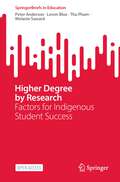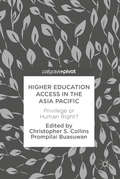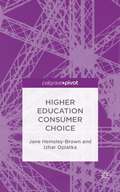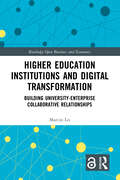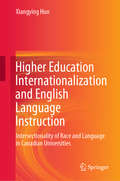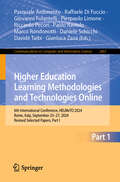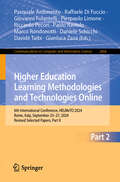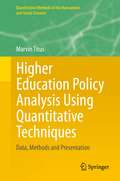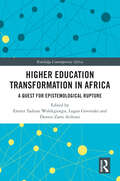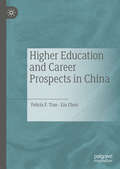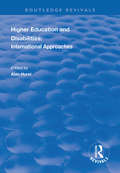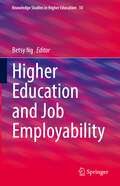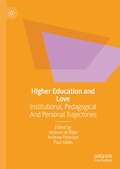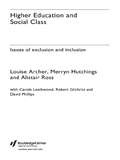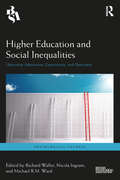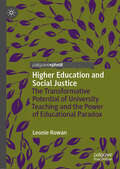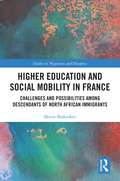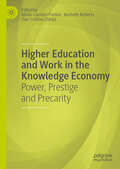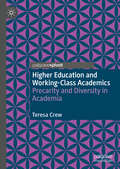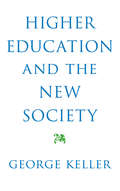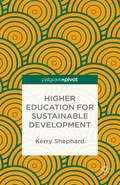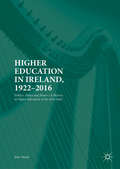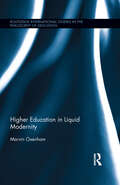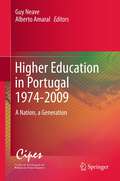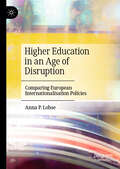- Table View
- List View
Higher Degree by Research: Factors for Indigenous Student Success (SpringerBriefs in Education)
by Peter Anderson Levon Blue Thu Pham Melanie SawardThis open access book provides insights from Indigenous higher degree research (HDR) students on supervision practices in an Australian context. It examines findings from qualitative studies conducted with Indigenous HDR students from different academic disciplines, enrolled higher education institutions across Australia, and supervisors of Indigenous HDR students. Six types of data and their thematic analyses are presented, to understand the needs and experiences of both Indigenous HDR students and supervisors of Indigenous HDR students. This book also unpacks assumptions and commonly held beliefs about Indigenous HDR students, and shares what Indigenous HDRs report they need to experience success in higher education. It reports the experiences of supervisors of Indigenous HDR students, and explore further opportunities which enhance the higher education experiences of Indigenous HDR students. This book also suggests how successful relationships between Indigenous HDR students, and their supervisors may be fostered, and aims to be a useful resource for Indigenous peoples wishing to pursue higher education, and HDR supervisors in countries with Indigenous populations.
Higher Education Access in the Asia Pacific
by Prompilai Buasuwan Christopher S. CollinsThis edited volume offers empirical, evaluative, and philosophical perspectives on the question of higher education as a human right in the Asia Pacific. Throughout the region, higher education has grown rapidly in a variety of ways. Price, accessibility, mobility, and government funding are all key areas of interest, which likely shape the degree to which higher education may be viewed as a human right. Although enrollments continue to grow in many higher education systems, protests related to fees and other equity issues continue to grow. This volume will include scholarly perspectives from around the region for a more extensive understanding of higher education as a human right in the Asia Pacific.
Higher Education Consumer Choice
by Izhar Oplatka Jane Hemsley-BrownHigher Education Consumer Choice provides a comprehensive and highly focused critical analysis of research on HE consumer choice behaviour in the UK and around the world. Ideal for students, scholars and marketing practitioners interested in consumer choice and behaviour in higher education markets, the book explores the background and context to research on HE choice including globalization, changing supply and demand, fees and costs, and concerns about social disadvantage. Focusing on personal factors that influence consumer choice, group aspects of consumer behaviour such as cultural and ethnic differences, as well as theoretical and research models, this book is designed to stimulate new debate and criticism of HE consumer choice.
Higher Education Institutions and Digital Transformation: Building University-Enterprise Collaborative Relationships (Routledge Open Business and Economics)
by Marcin LisThe growing complexity, fluidity and instability of the environment as well as changing needs are challenges that both enterprises and higher education institutions must face. Higher education institutions understand that their key product, i.e. knowledge, is a value that can and should be offered to enterprises in a desirable form as a key to innovation and development as well as the basis of the necessary internal transformation to respond to requirements of our times. Attempts to explain the process of collaboration between higher education institutions and businesses based on an institutional perspective fail to capture the complexity of this process. The purpose of this book is to develop a model approach to managerial competencies that affect the innovativeness of enterprises and to identify internal and external key factors strengthening or limiting the impact of managerial competencies on the innovativeness of an enterprise including organizational structure, strategy, organizational culture and more. It will be of value to researchers, academics, and students in the fields of entrepreneurship, innovation, management, strategy, and will be particularly useful to organizations that are aware of their operating conditions in the knowledge-based economy and of the impact of the COVID-19 pandemics on the acceleration of the digital transformation of the contemporary world.
Higher Education Internationalization and English Language Instruction: Intersectionality of Race and Language in Canadian Universities
by Xiangying HuoThis book offers new understanding of the implications of pluralism and of transnational movements to higher education and the construct of a “native speaker” within contemporary globalization processes. Theoretically, it calls for a revisioned English as an International Language (EIL) pedagogy and a wider acceptance of EIL and of World Englishes. It challenges the postsecondary education sector to change the discourse around language proficiency to one that engages the “pluralism of English.” As for the applied significance, the book contributes to the work on neo-racism which means racism goes beyond color to stereotypic foreign cultures, nationalities, and exotic accents based on cultural distinctions instead of merely skin differences. The book contributes to higher education policy and practice, pushing a revisioning of ESL in conceptual and pedagogical ways, such as designing more culturally oriented curriculum, implementing culturally responsive pedagogy, and valuing the teaching proficiency more than the language proficiency.
Higher Education Learning Methodologies and Technologies Online: 6th International Conference, HELMeTO 2024, Rome, Italy, September 25–27, 2024, Revised Selected Papers, Part I (Communications in Computer and Information Science #2467)
by Riccardo Pecori Paolo Raviolo Pierpaolo Limone Davide Taibi Raffaele Di Fuccio Giovanni Fulantelli Pasquale Ardimento Marco Rondonotti Daniele Schicchi Gianluca ZazaThe two-volume set CCIS 2467 and 2468 constitutes the refereed post-conference proceedings of the 6th International Conference on Higher Education Learning Methodologies and Technologies Online, HELMeTO 2024, held in Rome, Italy, during September 25–27, 2024. The 46 revised full papers presented in these proceedings were carefully reviewed and selected from 101 submissions. The papers are organized in the following topical sections: Part I: Artificial Intelligence in Education – Emerging Technologies and Digital Transformation in Education.Part II: Inclusion, Well-being, and Student Support – Educational Policy, Ethics, and Teacher Professional Development.
Higher Education Learning Methodologies and Technologies Online: 6th International Conference, HELMeTO 2024, Rome, Italy, September 25–27, 2024, Revised Selected Papers, Part II (Communications in Computer and Information Science #2468)
by Riccardo Pecori Paolo Raviolo Pierpaolo Limone Davide Taibi Raffaele Di Fuccio Giovanni Fulantelli Pasquale Ardimento Marco Rondonotti Daniele Schicchi Gianluca ZazaThe two-volume set CCIS 2467 and 2468 constitutes the refereed post-conference proceedings of the 6th International Conference on Higher Education Learning Methodologies and Technologies Online, HELMeTO 2024, held in Rome, Italy, during September 25–27, 2024. The 46 revised full papers presented in these proceedings were carefully reviewed and selected from 101 submissions. The papers are organized in the following topical sections: Part I: Artificial Intelligence in Education – Emerging Technologies and Digital Transformation in Education.Part II: Inclusion, Well-being, and Student Support – Educational Policy, Ethics, and Teacher Professional Development.
Higher Education Policy Analysis Using Quantitative Techniques: Data, Methods and Presentation (Quantitative Methods in the Humanities and Social Sciences)
by Marvin TitusThis textbook introduces graduate students in education and policy research to data and statistical methods in state-level higher education policy analysis. It also serves as a methodological guide to students, practitioners, and researchers who want a clear approach to conducting higher education policy analysis that involves the use of institutional- and state-level secondary data and quantitative methods ranging from descriptive to advanced statistical techniques. This book is unique in that it introduces readers to various types of data sources and quantitative methods utilized in policy research and in that it demonstrates how results of statistical analyses should be presented to higher education policy makers. It helps to bridge the gap between researchers, policy makers, and practitioners both within education policy and between other fields.Coverage includes identifying pertinent data sources, the creation and management of customized data sets, teaching beginning and advanced statistical methods and analyses, and the presentation of analyses for different audiences (including higher education policy makers).
Higher Education Transformation in Africa: A Quest for Epistemological Rupture (ISSN)
by Emnet Tadesse Woldegiorgis, Logan Govender and Dennis Zami AtibuniThis book critically interrogates the notion of transformation in higher education, focusing on epistemological and structural issues in postcolonial and contemporary Africa.The book considers the multifaceted challenges facing higher education in the continent and uses the concept of transformation as a common thread weaving through a range of issues, including epistemology, identity, relevance, research, collaboration and decoloniality. Arguing for a holistic approach towards progressive and innovative education systems, the book calls for a fundamental transformation that expands access, enhances quality and competitiveness, addresses past injustices and improves the capacity to act together for a more sustainable and just future. Overall, the book makes a powerful case for the power of transformation in higher education to shape the social, economic and cultural fabric of society.This book’s critical evaluation of knowledge production in Africa will be an important read for researchers and policymakers involved in Africa’s higher education sector.
Higher Education and Career Prospects in China
by Lin Chen Felicia F. TianThis book explores how students in China vary in their understanding of careers upon arrival at college and how these initial differences develop into distinctive career preparation pathways. Drawing on survey data, students’ self-reflections, and semi-structured interviews over the four years, the book examines students’ engagement in curricular and extracurricular activities, as well as their interactions with peers, faculty, and staff, and how this affects their ability to navigate, develop, and cultivate career prospects and relevant skills. It also considers how colleges may aggravate social inequality rather than equalize among students with divergent family backgrounds through cumulative advantage framework, impacting on their conceptualization and construction of careers. Addressing a key generation in a key market, this text will interest students, scholars and practitioners in sociology, social work, education, and public policy, career counselling, student affairs, human resources, and education policy.
Higher Education and Disabilities: International Approaches (Routledge Revivals)
by Alan HurstFirst published in 1998, this volume compares disability services and strategies along with students with disabilities across various countries around the world. Its publication followed a series of conferences held at different international locations. These papers have been brought together with the aim to better inform our understanding of approaches to disabled students and their experiences. Focusing on topics such as the Australian Disability Discrimination Act (1992), disability policy and supporting students with disabilities in higher education, this volume will be of use to students, lecturers, researchers and policymakers, whether able-bodied, neurotypical or disabled.
Higher Education and Job Employability (Knowledge Studies in Higher Education #10)
by Betsy NgThis book presents the most comprehensive discussion of emerging trends in higher education in the Asia Pacific, ranging from graduate attributes to integrated workplace learning, with an in-depth focus on work readiness, employability and career development. It draws on the relationship between graduate attributes and employability, as well as vocational training or internship programs. It offers theoretical and empirical analyses that institutions, decision-makers or academics can work on together to enhance job employability. This volume will also include issues such as development of emerging and employability skills, as well as directions for the changing nature in real-world settings. The book consists of contributions from experienced international authors, offering detailed insights for those who want a timely understanding of the latest trends in higher education.
Higher Education and Love: Institutional, Pedagogical and Personal Trajectories
by Andrew Peterson Paul Gibbs Victoria De RijkeThis book explicitly unites the concepts of higher education and love to examine how these concepts are mutually compatible. As the world of higher education moves towards the metrics of value, and the worth of knowledge becomes more valued in its use rather than its discovery, a crisis brews. If higher education is to contribute to the wellbeing of the self and of others, then the institution needs to be radically reviewed to see if, and how, love contributes to higher education within and beyond its walls. This book addresses the core question of what would the university might be like, today and into the future, if the timeless notion of love was the basis of its educative process, notwithstanding the material artefacts the university helps to create, but also as a way of framing approaches to higher education.
Higher Education and Social Class: Issues of Exclusion and Inclusion
by Alistair Ross Louise Archer Merryn HutchingsWorking class groups have historically been excluded from participation in higher education. Past decades have seen an expansion of the system towards a more inclusive higher education, but participation among people from working class groups has remained persistently low. Is higher education unattractive for these groups or are the institutions acting to exclude them?This thought-provoking and revealing book examines the many factors and reasons why working class groups are under-represented in higher education. In particular, the book addresses issues around differential access to information about university, the value of higher education to working class groups, the costs of participating and the propensity to participate. Issues of gender and ethnicity are also explored and questions are raised for those who are currently involved in 'widening participation' projects and initiatives. A unique feature of the book is that its findings are drawn from an innovative study where the views of both working class participants and non-participants in higher education were explored.This book will be of interest to students of social policy, educational studies and sociology of education at undergraduate and postgraduate level. Academics, researchers and policy makers nationally and internationally will also find it valuable.
Higher Education and Social Inequalities: University Admissions, Experiences, and Outcomes (Sociological Futures)
by Nicola Ingram Richard Waller Michael R.M. WardA university education has long been seen as the gateway to upward social mobility for individuals from lower socio-economic backgrounds, and as a way of reproducing social advantage for the better off. With the number of young people from the very highest socio-economic groups entering university in the UK having effectively been at saturation point for several decades, the expansion witnessed in participation rates over the last few decades has largely been achieved by a modest broadening of the base of the undergraduate population in terms of both social class and ethnic diversity. However, a growing body of evidence exists in the continuation of unequal graduate outcomes. This can be seen in terms of employment trajectories in the UK. The issue of just who enjoys access to which university, and the experiences and outcomes of graduates from different institutions remain central to questions of social justice, notably higher education’s contribution to social mobility and to the reproduction of social inequality. This collection of contemporary original writings explores these issues in a range of specific contexts, and through employing a range of theoretical and methodological approaches. The relationship between higher education and social mobility has probably never been under closer scrutiny. This volume will appeal to academics, policy makers, and commentators alike. Higher Education and Social Inequalities is an important contribution to the public and academic debate.
Higher Education and Social Justice: The Transformative Potential of University Teaching and the Power of Educational Paradox
by Leonie RowanThis book demonstrates how the pedagogical decision making of university academics can be shaped by engagement with an educational philosophy known as “relationship-centred education”. Beginning with critical analysis of concepts such as student engagement, student satisfaction, and student-centred learning, the author goes on to investigate how literature relating to social justice challenges educators to consider these terms in particular ways. From this basis, the book explores the factors featuring in inclusive, respectful, diverse and student-centred environments. In analysing these factors, the author illuminates the perspectives of university teachers who struggle with the unique challenges of working in the academy; including an increasingly broad set of employment demands and narrower criteria for determining ‘impact’, all while retaining focus on the transformative potential of higher education. This book will be of interest to students and scholars of transformative learning, as well as social justice within higher education.
Higher Education and Social Mobility in France: Challenges and Possibilities among Descendants of North African Immigrants (Studies in Migration and Diaspora)
by Shirin ShahrokniThis book offers an in-depth sociological exploration of the social trajectories and experiences of children of post-colonial immigrants in France who are embarking on paths of extreme upward intergenerational mobility. The author draws on life history interviews with young adults of North African immigrant background, enrolled at or having recently graduated from the country’s elite higher education institutions, the grandes écoles, to delve into largely under-researched pathways and give a voice to high-achieving members of a population that continues to be collectively associated with difficulties to ‘integrate’. The volume constitutes the first sociological study to document, from the individual actor’s perspective, the everyday experience of racism within France’s elite educational institutions and to reveal the upward mobility experience to be informed by the interlocking effects of racial processes, immigrant ancestry, class background, and gender. Challenging the pervasive representation of descendants of North African immigrants as ‘unsuccessful’ and ‘unable to integrate’, this book sheds light on the experiences of the largely silent upwardly mobile members of a stigmatized minority group, revealing the strategies used to respond to the constraints to their mobility and the importance of familial histories of post-colonial migration, characterized by the former generation’s efforts, sacrifices, and resilience, in informing these ‘success stories’.
Higher Education and Work in the Knowledge Economy: Power, Prestige and Precarity
by Kenneth Roberts Maria-Carmen Pantea Dan-Cristian DabijaIn recent years, the ‘knowledge economy’ has re-entered political discourse as a future-oriented, seductive and optimistic concept. It heralds knowledge and intellectual capability as unlimited and mobile resources of production that can be used for the prosperity of all. Knowledge economy has been linked with the promise of fairness, free from the traditional factors of production, with education as the only prerequisite. This interdisciplinary volume examines the career paths of university graduates, the role of higher education and the internal hierarchies shaping employment in the knowledge economy. The promise of fairness and social inclusivity has not yet played out. Despite increasing numbers of degree holders, the advancements of AI and other technologies is now expected to bring a ‘knowledge substitution’ rather than a human-centred knowledge economy. This book raises questions about the kind of jobs being made available, their social and political implications and how the main sociological themes of gender, class, education, ethnicity, age and location play a role. It will be of great interest to scholars and students of work and employment, higher education, youth studies and knowledge management.
Higher Education and Working-Class Academics: Precarity and Diversity in Academia
by Teresa CrewThis book examines how a working-class habitus interacts with the elite culture of academia in higher education. Drawing on extensive qualitative data and informed by the work of Pierre Bourdieu, the author presents new ways of examining impostor syndrome, alienation and microaggressions: all common to the working-class experience of academia. The book demonstrates that the term ‘working-class academic’ is not homogenous, and instead illuminates the entanglements of class and academia. Through an examination of such intersections as ethnicity, gender, dis/ability, and place, the author demonstrates the complexity of class and academia in the UK and asks how we can move forward so working-class academics can support both each other and students from all backgrounds.
Higher Education and the New Society
by George KellerWhile he celebrated higher education as the engine of progress in every aspect of American life, George Keller also challenged academia’s sacred cows and entrenched practices with provocative ideas designed to induce "creative discomfort." Completed shortly before his death in 2007, Higher Education and the New Society caps the career of one of higher education’s exceptional minds. Refining and expanding ideas Keller developed over his fifty-year career, this book is a clarion call for change. In the face of a transformed American society marked by population shifts, technological upheavals, and a volatile economic landscape, Keller urges leaders in higher education to see and confront their own serious problems.With characteristic forthrightness and inimitable wit, Keller targets critical areas where bold thinking is especially important, taking on such explosive issues as the configuration of academic disciplines, the runaway problem of big-time sports, the decline of the liberal arts, and the urgent problems of finances and costs. Keller expected this book to ignite discussion and controversy within academic circles, and he hoped fervently that it would also lead to real thinking, real analysis, and urgently needed transformation.
Higher Education for Sustainable Development
by Kerry ShephardThis book asks how higher education should approach the task of educating for sustainability and then sets to answering it. It provides a guide for those who advocate for sustainability and for those who do not and makes a point of emphasising that all in higher education have the capacity and willingness to contribute in some way. The challenge is to find an approach that unifies the efforts of higher education teachers towards sustainability objectives, rather than dividing them. People at universities across the world were consulted and a grounded theory was devised. This encourages all university teachers to teach what they want to teach openly and honestly, about sustainability or not; but on the way to ensure that their students develop the critical skills that will enable them to fully understand what is being taught and what they are learning.
Higher Education in Ireland, 1922–2016: Politics, Policy and Power—A History of Higher Education in the Irish State
by John WalshThis book explores the emergence of the modern higher education sector in the independent Irish state. The author traces its origins from the traditional universities, technical schools and teacher training colleges at the start of the twentieth century, cataloguing its development into the complex, multi-layered and diverse system of the early twenty-first century. Focusing on the socio-political and cultural contexts which shaped the evolution of higher education, the author analyses the interplay between the state, academic institutions and other key institutional actors – notably churches, cultural organizations, employers, trade unions and supranational bodies. This study explores policy, structural and institutional change in Irish higher education, suggesting that the emergence of the modern higher education system in Ireland was influenced by ideologies and trends which owed much to a wider European and international context. The book considers how the exercise of power at local, national and international level impinged on the mission, purpose and values of higher education and on the creation and expansion of a distinctive higher education system. The author also explores a transformation in public and political understandings of the role of higher education, charting the gradual evolution from traditionalist conceptions of the academy as a repository for cultural and religious value formation, to the re-positioning of higher education as a vital factor in the knowledge based economy. This comprehensive volume will appeal to students and scholars of the Irish education system, educators and practitioners in the field, and those interested in higher education in Ireland more generally.
Higher Education in Liquid Modernity (Routledge International Studies in the Philosophy of Education #30)
by Marvin OxenhamBased in sociologist Zygmunt Bauman’s theory of liquid modernity, this volume describes and critiques key aspects and practices of liquid education--education as market-driven consumption, short life span of useful knowledge, overabundance of information--through a systematic comparison with ancient Greek paideia and medieval university education, producing a sweeping analysis of the history and philosophy ofeducation for the purpose of understanding current higher education, positing a more holisitic alternative model in which students are embedded in a learning commutity that is itself embedded in a larger society. If liquid modernity has left a vacuum where, according to Bauman, the pilot’s cabin is empty, this volume argues that no structure is better positioned to fill this vacuum than the university and outlines a renewed vision of social transformation through higher education.
Higher Education in Portugal 1974-2009
by Guy Neave Alberto AmaralA comprehensive, wide ranging and detailed account of the unfolding of higher education and higher education policy in Portugal from 1974 to 2009 by leading policy-makers and scholars, with the explicit purpose of showing how different disciplinary canons and perspectives contribute to the study of higher education and higher education policy including Law and Science Policy perspectives. Whilst focusing on one referential system, this book deals with current policy issues emerging in the wake of the post Bologna period. It also examines their long term historical origins in addition to the measures taken to address them. The substantive chapters are preceded by a detailed Introductory overview that places the issues treated in this volume in a solidly European perspective and sets out explicitly the differences in the dominant political, cultural and social values that set Portuguese as other Continental European systems of higher education apart from their Anglo Saxon counterparts.
Higher Education in an Age of Disruption: Comparing European Internationalisation Policies
by Anna P. LohseThis book investigates European higher education internationalisation policies during a period marked by extreme upheaval due to Brexit and the COVID-19 pandemic. Situating her analysis at the intersection of higher education research and policy studies, the author combines historical and sociological institutionalism to investigate how this time of disruption impacted higher education policies in England, France and Germany. Based on extensive qualitative data derived from expert interviews and document analysis, the study offers timely insights into dynamics of institutional change and stability in higher education governance, as well as implications for the future of cross-border education and internationalisation. The book will appeal to academics and students interested in education policy and the internationalisation of higher education.
